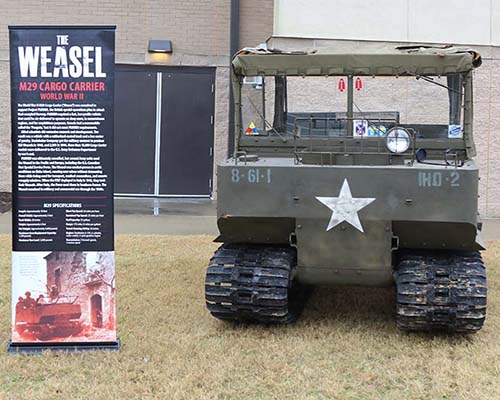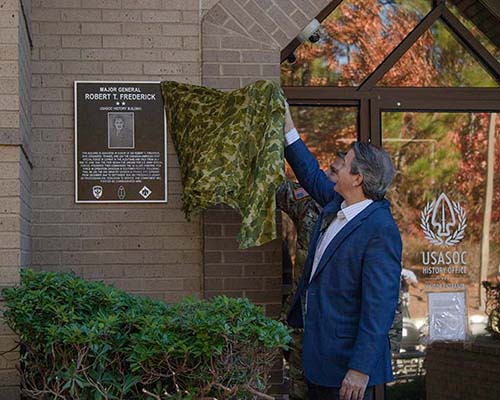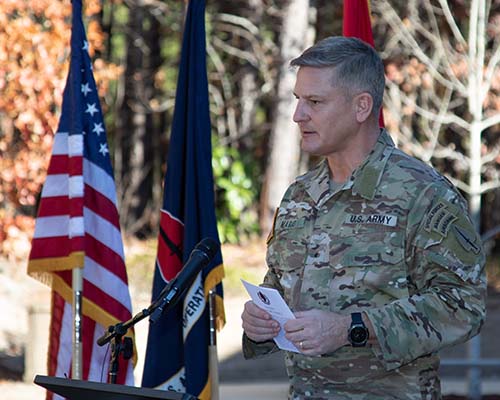“To be a successful soldier you must know history, [and] read it objectively…”— General George S. Patton, Jr.
MISSION
Preserve the institutional memory and organizational history of ARSOF; inform ARSOF leaders and soldiers, the Army, the Department of Defense, and the nation on ARSOF legacy; and inspire ARSOF soldiers past, present, and future by connecting them with their rich heritage.
PRIORITIES
- Execute a historical program in accordance with Commanding General, USASOC priorities and guidance
- Perform regulatory functions of a U.S. Army command history office, including production of the annual command history and execution of an oral history program
- Preserve the institutional knowledge of the command by collecting and safeguarding ARSOF historical assets
- Publish print and web-based historical products conveying ARSOF history and legacy
- Provide historical support to commanders and units across the ARSOF enterprise.
DOWNLOAD
USASOC is a command proud of its history, which extends back to the psychological warfare campaign in World War I and postwar military government efforts. The USASOC History Office exists to ensure that Army Special Operations Forces (ARSOF) history is preserved and effectively presented to both internal and external audiences in ways that both inform and inspire. It implements the Army Historical Program at the USASOC level and provides timely historical support and analysis to ARSOF leaders and their units. This support can take many forms, as seen below.
History
The USASOC History Office was established as part of the Commanding General’s (CG’s) Special Staff, shortly after the activation of USASOC on 1 December 1989. In its earliest years, it consisted of a Command Historian and one or two assistant historians. These historians documented ARSOF participation in Operations JUST CAUSE, DESERT SHIELD, and DESERT STORM and, in 1994, produced Standing Up the MACOM, a command history covering USASOC’s first five years of existence.
Following the 9/11 attacks on the American homeland, ARSOF played a prominent role in the Global War on Terrorism (GWOT). As ARSOF expanded to meet the demands of GWOT, so too did the History Office. By 2011, it had five Department of the Army civilian historians: the Command Historian, Deputy Command Historian, and branch historians for Civil Affairs (CA), Psychological Operations (PSYOP), and Special Forces (SF). The Deputy covered the U.S. Army John F. Kennedy Special Warfare Center and School (USAJFKSWCS) and the 75th Ranger Regiment history, while dedicated Special Operations Aviation and ARSOF Support/Sustainment historians were added in 2017 and 2018, respectively. The office also established a History Support Center, consisting of archivists, digitization specialists, and graphic design specialists.
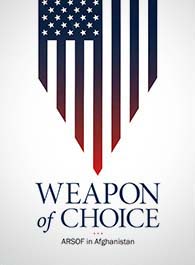
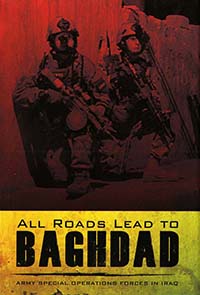
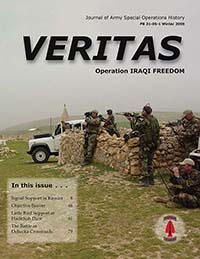
A major focus of the office in the post-9/11 era has been historical publications. This began when Lieutenant General Bryan D. Brown, CG, USASOC, from 2000 to 2002, commissioned a book on the first year of Operation ENDURING FREEDOM. Published in 2003 as Weapon of Choice: ARSOF in Afghanistan, it was followed soon after by All Roads Lead to Baghdad: Army Special Operations Forces in Iraq, documenting ARSOF contributions to the initial phase of Operation IRAQI FREEDOM.
In 2005, the History Office began publishing Veritas: Journal of Army Special Operations History, reviving the name of a Vietnam War-era newsletter produced by USAJFKSWCS. Initially a quarterly publication, Veritas became less frequent over time, as the office diversified its publication efforts. New publications included The Last Full Measure of Devotion, honoring the ARSOF Fallen from the post-9/11 era; Indomitable Valor, recognizing ARSOF Medal of Honor recipients; an Office of Strategic Services (OSS) Primer; and a series of branch-specific history handbooks.
In late 2018, the History Office established internal ARSOF History websites on the NIPR and SIPR networks and, in 2019, it launched a public website. These websites feature Veritas articles, thematic microsites, biographies of iconic ARSOF figures, and other content from the office’s print publications. The public website, www.ARSOF-History.org, currently averages 35,000 monthly page views.
Beyond publications, the History Office actively collects historically significant materials and conducts hundreds of oral history interviews with current and former ARSOF personnel annually. The overseas collection mission began in 1991, when the Command Historian deployed to Saudi Arabia and Kuwait to document the ARSOF role in Operations DESERT SHIELD and DESERT STORM. Since then, USASOC historians have deployed to ARSOF forward locations around the world, including Afghanistan, Colombia, Haiti, Iraq, Jordan, the Philippines, Qatar, and Syria.
In 2009, the History Office assumed responsibility for the ARSOF archival holdings, previously located at USAJFKSWCS. This repository is not staffed or chartered as a public research facility, in the same vein as the U.S. Army Heritage and Education Center, the National Archives and Records Administration, or the National Personnel Records Center. However, it is available to current ARSOF personnel, on request. Looking ahead, the History Office plans to make its collection even more accessible to the ARSOF force through a cloud-based digital asset management solution.
Another enduring mission of the History Office is to provide historical support to leaders across the command. This support takes many forms, including information papers in response to specific requests for information; training, education, and leader development; and assistance with historical display projects that visually convey ARSOF history. Other examples of historical support are assistance with unit memorialization actions, providing distinguished visitors with guided tours of the USASOC Memorial Plaza, and presenting an ARSOF History overview during USASOC Onboarding.
Recent Efforts
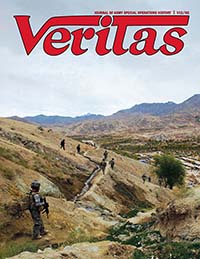
While not unaffected by the COVID-19 pandemic, the History Office adapted quickly, with only minor impacts on the mission. During this period, it published two issues of Veritas, a 528th Sustainment Brigade History Handbook, and an updated ARSOF History Timeline. It also launched a series of thematic microsites, including ARSOF in the Korean War, ARSOF in Panama. It continued support to training and education by teaching CA, PSYOP, and SF history classes at both the institutional (USAJFKSWCS) and unit level. One recent instance of this came in May 2021, when the PSYOP Historian led a leader professional development (LPD) session for 1st Psychological Operations Battalion focusing on Operation JUST CAUSE.
Pandemic-induced travel restrictions impaired in-person collection efforts, but digital collections continued unabated. For example, the office has, to-date, digitally collected over 1,500 documents related to the COVID-19 response. These have been transmitted to the U.S. Army Center of Military History as part of an Army-wide effort, in addition to being retained locally for future reference.
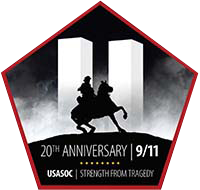
In 2021, the History Office spearheaded USASOC’s commemoration of the 20th anniversary of 9/11 and the start of GWOT. This effort included the redistribution of GWOT-themed products; a photo display outside the Heritage Auditorium; filmed testimonials from ARSOF soldiers, civilians, and veterans describing the impact of 9/11; and a microsite hosting digital content related to the commemoration. It also updated The Last Full Measure of Devotion to include all 377 ARSOF Fallen since 11 September 2001 and developed three historical displays for the USASOC Force Modernization Center.
On 3 December 2021, the History Office formally dedicated its building in memory of Major General Robert T. Frederick, who commanded the First Special Service Force (FSSF) from 1942 to 1944. The FSSF was a combined U.S.–Canadian unit specializing in mountain warfare that made decisive contributions to the Allied victory in World War II. Disbanded on 5 December 1944, commemorated annually as Menton Day, the FSSF is the lineage predecessor of all U.S. Army Special Forces units. The guest of honor at the dedication ceremony was Mr. Brad Hicks, grandson of MG Frederick. Brigadier General Steven Marks, Deputy Commanding General, USASOC, provided the keynote address. Other distinguished visitors included a Canadian SOF officer serving at Fort Bragg, and leaders from USAJFKSWCS, 1st Special Forces Command, and the U.S. Army Special Operations Aviation Command.
